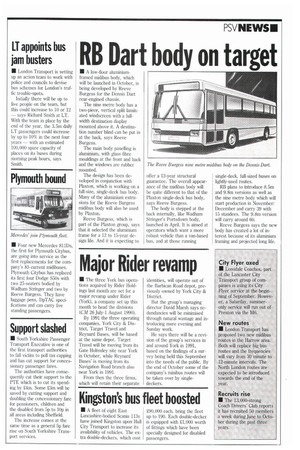RB Dart body on target
Page 19

If you've noticed an error in this article please click here to report it so we can fix it.
• A low-floor aluminiumframed midibus body, which will be launched in October, is being developed by Reeve Burgess for the Dennis Dart rear-engined chassis.
The nine metre body has a two-piece, vertical split laminated windscreen with a fullwidth destination display mounted above it. A destination number blind can be put in at the back, says Reeve Burgess.
The main body panelling is aluminium, with glass fibre mouldings at the front and back and the windows are rubber mounted.
The design has been developed in conjunction with Plaxton, which is working on a full-size, single-deck bus body. Many of the aluminium extrusions for the Reeve Burgess midibus body will also be used by Plaxton.
Reeve Burgess, which is part of the Plaxton group, says that it selected the aluminium frame for a 12 to 15-year design life. And it is expecting to offer a 12-year structural guarantee. The overall appearance of the midibus body will be quite different to that of the Plaxton single-deck bus body, says Reeve Burgess.
The body is stepped at the back internally, like Wadham Stringer's Portsdow-n body, launched in April. It is aimed at operators which want a more robust vehicle than a van-based bus, and at those running
single-deck, full-sized buses on lightly-used routes.
RB plans to introduce 8.5m and 9.8m versions as well as the nine metre body which will start production in November/ December and carry 39 with 15 standees. The 9.8m version will carry around 60.
Reeve Burgess says the new body has created a lot of interest because of its aluminium framing and projected long life.




















































































